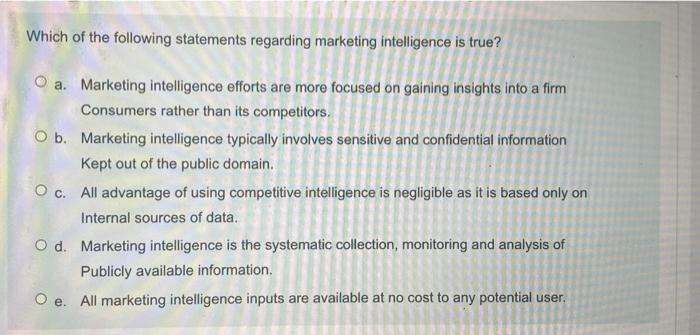Which of the following statements regarding marketing intelligence is true? This question delves into the realm of marketing intelligence, a critical aspect of business strategy that empowers organizations to make informed decisions based on data-driven insights. As we explore the intricacies of marketing intelligence, we will uncover its multifaceted nature, its diverse applications, and its profound impact on business success.
Marketing intelligence encompasses a wide range of activities, including gathering, analyzing, and interpreting market data to gain a comprehensive understanding of customer behavior, industry trends, and competitive landscapes. By leveraging this intelligence, businesses can tailor their marketing strategies to meet the evolving needs of their target audience, optimize their marketing campaigns, and maximize their return on investment.
1. Marketing Intelligence and its Purpose

Marketing intelligence is the systematic and ethical collection and analysis of information about the market, customers, and competitors. Its primary goal is to provide businesses with actionable insights that can inform decision-making and improve marketing strategies.
Types of Marketing Intelligence
Marketing intelligence can be categorized into various types:
- Market intelligence:Data and insights about the overall market, including trends, size, growth potential, and competitive landscape.
- Customer intelligence:Information about customer behavior, preferences, needs, and satisfaction levels.
- Competitive intelligence:Data on competitors’ strategies, products, pricing, and market share.
- Internal intelligence:Data from within the organization, such as sales figures, customer feedback, and financial performance.
Sources of Marketing Intelligence
Marketing intelligence can be gathered from various sources:
- Internal sources:Sales reports, customer feedback, market research, and social media monitoring.
- External sources:Industry publications, market research firms, competitive analysis tools, and social media listening.
- Human sources:Interviews with customers, industry experts, and competitors.
Benefits of Marketing Intelligence
Using marketing intelligence offers numerous benefits:
- Informed decision-making:Provides data-driven insights to support strategic planning and execution.
- Improved customer targeting:Enables businesses to better understand customer needs and preferences.
- Increased ROI:Helps businesses allocate resources more effectively and maximize return on marketing investments.
li> Enhanced competitive advantage:Provides insights into competitors’ strategies and vulnerabilities.
Challenges of Marketing Intelligence
Marketing intelligence also presents challenges:
- Data overload:The abundance of data can make it difficult to extract meaningful insights.
- Ethical concerns:Gathering and using marketing intelligence must adhere to ethical and legal standards.
- Resource constraints:Implementing a comprehensive marketing intelligence program can require significant time and resources.
Marketing Intelligence in Action, Which of the following statements regarding marketing intelligence is true
Case Study: A consumer goods company used marketing intelligence to understand customer preferences for a new product launch. They conducted surveys, focus groups, and social media listening to gather data on customer needs, competitive offerings, and potential market demand. The insights gained from this intelligence helped them develop a successful product strategy that resonated with the target market.
Future of Marketing Intelligence
Marketing intelligence is continuously evolving with advancements in technology and data analytics:
- Artificial intelligence (AI):AI-powered tools automate data analysis and provide predictive insights.
- Big data:Access to vast amounts of data enables businesses to gain deeper insights into market trends and customer behavior.
- Real-time data:Advancements in data collection and processing allow businesses to monitor market changes in real time.
These advancements will continue to shape the future of marketing intelligence, empowering businesses to make more informed decisions and stay ahead of the competition.
General Inquiries: Which Of The Following Statements Regarding Marketing Intelligence Is True
What is the primary goal of marketing intelligence?
The primary goal of marketing intelligence is to provide businesses with actionable insights into their target market, competitive landscape, and industry trends, enabling them to make informed decisions and optimize their marketing strategies.
What are the different types of marketing intelligence?
There are various types of marketing intelligence, including customer intelligence, competitive intelligence, market intelligence, and internal intelligence.
What are the benefits of using marketing intelligence?
Marketing intelligence offers numerous benefits, such as improved decision-making, optimized marketing campaigns, increased customer satisfaction, and enhanced competitive advantage.

